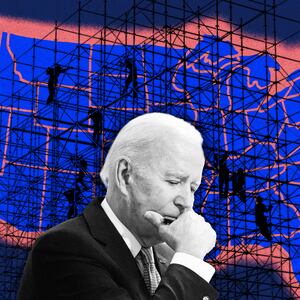Faced with a struggling domestic agenda and the increasing likelihood of a Democratic electoral rout in November, President Joe Biden — in a nearly two-hour-long press conference Wednesday — finally conceded that chopping up his signature Build Back Better (BBB) package may be the only remaining path to passing any of his legislative agenda.
Even worse, Biden conceded that his plan to divide BBB into standalone bills will likely mean tough choices over what portions of the package survive and which die. Originally floated at a lofty $3.5 trillion over 10 years, Biden was only willing to specifically name universal pre-kindergarten and $500 billion in new climate funding as priorities for his new, stripped-down approach.
That’s a huge red flag for progressives.
Biden deserves praise for his commitment to passing pre-K and climate legislation, both critical priorities with generational impacts for the American people. But the administration’s new approach — and Biden’s seeming shock that Republicans were blocking his agenda — means abandoning tougher votes like extending the child tax credit. That could send nearly four million kids back into poverty.
“I’m not sure I can get [the Child Tax Credit] in the package,” Biden admitted.
For the left, that amounts to nothing short of a betrayal following months standing shoulder-to-shoulder with the White House. And Biden’s plan sacrifices core progressive priorities with no guarantee that any of Biden’s agenda actually becomes law. The Senate is still unwilling to break its addiction to institutionalism and reform the filibuster, so even a potentially scaled-down version of the BBB plan is still destined for the political graveyard.
“It’s clear to me that we’re going to have to break it up,” Biden said of BBB’s remaining hopes. “I think we can break the package up, get as much as we can now, and then come back and fight for this thing,” the president added.
When pressed, Biden named $500 billion in environmental protection funding as one area where he believed Democrats could build consensus, along with early childhood education proposals like universal pre-K — which is supported even by holdout Democratic Sen. Joe Manchin of West Virginia. For progressive lawmakers, that likely means accepting a sharply-reduced agenda that jettisons many of the issues which initially united Biden and the House Progressive Caucus.
“I’m not asking for castles in the sky,” Biden said. “I’m asking for practical things the American people have been asking for for a long time.”
Biden’s proposed remedy — that Democrats make their case to the American people on issues ranging from Build Back Better to a stalled voting rights package — is a good one.
Unfortunately, a year in power has failed to yield unified, clear Democratic messaging that places these major issues in the urgent context Biden acknowledges is critical for victory.
And with a potentially disastrous Supreme Court decision on the future of Roe v. Wade looming in the coming months, Democrats will need to juggle their core issues in a way that denies them the opportunity to invest heavily on messaging any single piece of stalled legislation.
With the White House now scattering its unified BBB push, any lingering leverage progressives may have enjoyed will quickly dissolve. That will be music to the ears of Democratic centrists led by Rep. Josh Gottheimer of New Jersey, who threatened to kill Biden’s $1.2 trillion bipartisan infrastructure bill if the White House and House Speaker Nancy Pelosi continued to stand with progressive leader Rep. Pramila Jayapal of Washington and the Progressive Caucus. But it will also be a gut punch to Democratic voter enthusiasm at a time when the party has little enthusiasm to spare.
That’s an especially bitter pill for the left, who will now be asked to rally behind a Biden administration that has thus far failed to deliver on a vast array of promises — including addressing the nation’s student debt crisis, repairing the Trump-inflicted chaos on the southern border, and championing serious investments to combat climate change. And with 50 Senate Republicans guaranteeing a filibuster-bound Senate gets nothing done between now and 2024, progressives must now watch as their driving issues are divided and conquered by conservative Senate Democrats like Manchin and Kyrsten Sinema of Arizona.
At least Jayapal and House progressives can take small comfort in the fact that their dire warnings from last year proved depressingly correct. By passing the bipartisan infrastructure bill separately instead of tying its passage to BBB, Biden has effectively guaranteed that progressives’ key priorities will be dropped from consideration in favor of stripped-down versions of Biden’s original proposals.
“We always knew this was going to be an uphill fight,” Biden said, adding that he still believes Democrats can get “pieces and chunks of Build Back Better passed.” Sen. Manchin, for his part, counterprogrammed Biden’s press conference with a Senate floor speech, in which the senator dashed any plans to pass legislation with fewer than 60 votes.
Biden’s critical weakness rests, as always, in believing there is an untapped reservoir of goodness and civic-mindedness in the Trumpified Republican Party. Outlining his strategy to break a yearlong legislative logjam, Biden argued for challenging the GOP on what it stands for — but today’s Republicans couldn’t be clearer that they stand for nothing except the complete obstruction of a Democratic Party they regard as an enemy. Biden clearly drew the wrong lessons about Republicans from his eight years witnessing lockstep GOP obstruction as Barack Obama’s vice president.
Faced with challenging long-term structural problems to both America’s economy and its democracy, Biden has once again asked Americans to accept an incrementalist approach. That slow-roll method for passing core elements of Build Back Better may work in limited cases, but it will leave the American people with only a fraction of the structural support they need. That would be a terrible loss for the working class and American families, and a humiliating retreat for a once-confident Democratic Party.








